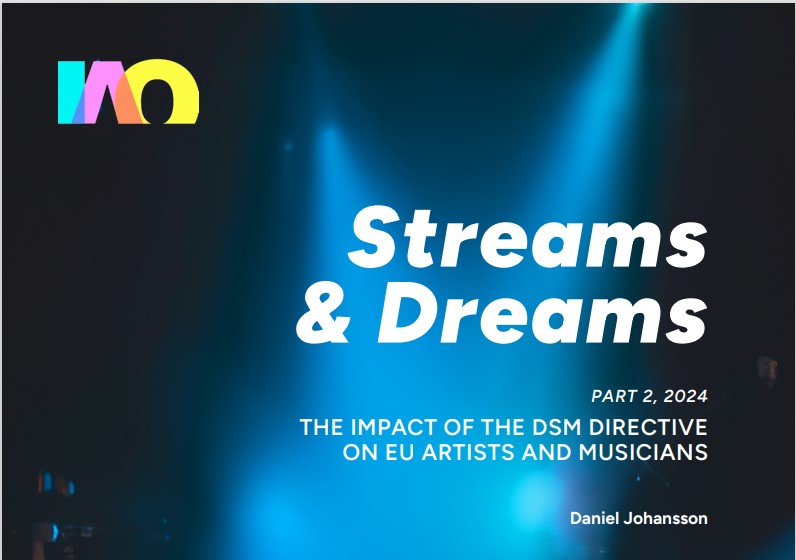
Long way to go again
to transparent and fair conditions for streaming
The high level of dissatisfaction is evident in the report Streams and Dreams Part 2, which documents artists' income and conditions. The report also shows a slight improvement for a small proportion of artists, but the extent of general dissatisfaction is remarkable. As is the low rate of organisation among music artists in Europe.
In the EU, politicians are focusing on artists' income and conditions. Before the summer holidays, several parts of a new EU directive (articles 18-22) were finally introduced into Danish law. This will guarantee more transparency, fair payment and the right to renegotiate for the artist. But how the new law will work in practice is still unknown and largely up to the individual countries. That's why the IAO, an international umbrella organisation for music artists, asked their members across 19 EU countries, plus the UK, for an update on how things are progressing in terms of getting better conditions.
The survey is the largest to date and shows a slight improvement for artists, possibly due to the implementation of the new legislation. But most notable to the report is the massive and overwhelming dissatisfaction of music artists with the primary market platforms, namely digital streaming services:
"Subscription systems in music streaming are unfair, the complexity and constant changes in algorithms create confusion - and your ability to choose another system is non-existent," summarises one of the many statements from the artists themselves in the report.
Lack of clarity on where revenue comes from
The new legislation includes a significant transparency requirement, giving artists the right to detailed information at least once a year about the revenue received by distributors and record labels. The information should cover all uses of the recording, including amounts received from for example: streaming platforms and digital downloads, social media platforms, physical sales, synchronisation and third-party licences.
The report's findings show that 64.7 % of artists do not receive the detailed information they are entitled to.
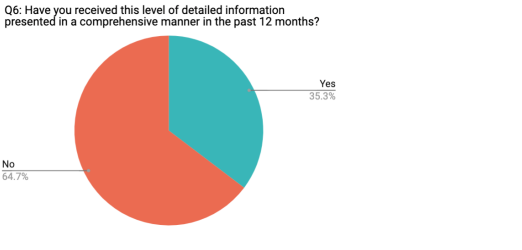
35.3 % answered yes to receiving detailed information and 64.7 % answered no.
Difficult negotiating position
The new directive offers better opportunities to increase payment or get more rights to their own music, but when artists are asked if they have made use of the legislators' backing to make more demands on their label, the answer is usually no. When it comes to the possibility to renegotiate payment, almost none of the artists have made use of the option.
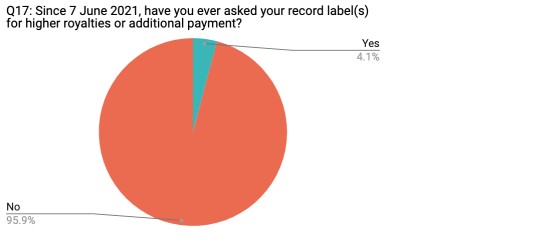
Only 4.1 % of artists have asked for higher royalties or better payment.
When it comes to session musicians, 70 per cent believe their payment has been too low. Just under half of them, 43.6 %, have no written contract with their client at all.
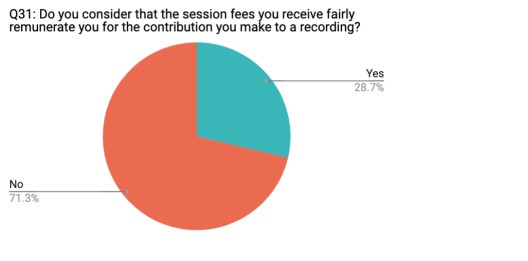
71.3 % of session musicians do not believe their payment is fair.
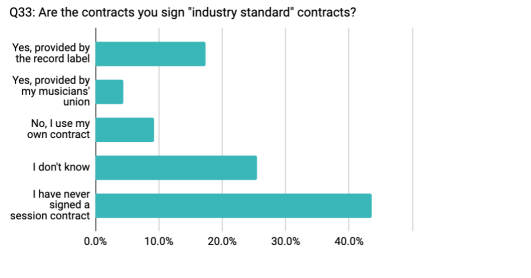
43.6 % of session musicians do not have a written contract.
The report's authors conclude that the problem is largely due to a lack of knowledge and a weak negotiating position. The Steams and Dreams Part 2 report also highlights that the most dissatisfied are those signed to small labels and those who have old deals with majors that they cannot get out of and that are 'too expensive' for the artist.
Collective bargaining may be a reason for better conditions in Denmark
Only 40 percent of artists who responded to the survey internationally are members of a trade union or professional organisation, and in some countries, such as Poland, new laws are on the way that will limit the right to collective bargaining.
"This study shows that too many music artists don't know enough about their rights and their business. Rights knowledge is complex for the individual, which is why it's important to be organised in a place where the community pays for impartial expertise that can advocate for them both collectively and individually," says Sara Indrio.
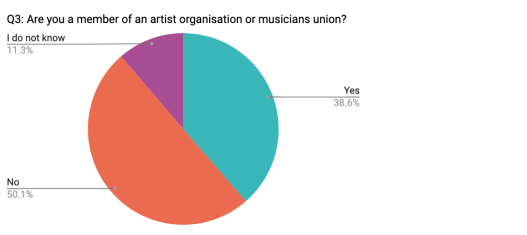
Photo caption: 38.6 % of European artists and musicians are members of a trade union.
At Dansk Artist Forbund you get help with individual contracts and a guarantee that someone is standing guard over rights and working conditions through framework agreements, consultation responses and collective agreements. Together with other artists' unions and organisations, you are represented in the collective management system, which has better tariffs for rights payments compared to other countries. Denmark's rights management system is characterised by joint contributions to collective pools, which also benefit new artists, non-profit projects and less commercial genres.
"A global market requires international solutions. It's important to maintain strong communities and ensure more international collaboration on organising. In Denmark, the numbers look significantly better overall - just not for a majority of artists in the streaming economy," says Sara Indrio.
Confusing business model and worrying implications
The report is supported by thousands of individual responses in the full survey. The responses are included both as data, graphs and as an extract of the open text responses. They show the greatest dissatisfaction with streaming platforms among artists and musicians who self-publish or publish on smaller labels. This is partly due to the platforms' payment model, which favours some music genres and consumption patterns over others, according to self-publishers.
"I'm particularly struck by the testimonies that show that even professional and established artists and musicians are fighting an unfair battle for survival. It's clear that a career in music is not a given for anyone, but the extent of the malaise and struggle for fair pay and insight is worrying and sadly not surprising. Politicians should be concerned about how the new legislation will be implemented, because it is certainly neither transparent nor fair as it stands today. In fact, we at the Danish Artist Association recommend an impartial commission that can shed light on how to rectify the situation," says Sara Indrio, chairperson of the Danish Artist Association and board member of IAO.
The problems are also significant for artists who have agreements with smaller labels. "It's remarkable to see the many challenges of the streaming market that artists describe as cheating, underpayment, lack of information and underpayment," says Sara Indrio:
"Many smaller labels are also struggling to survive, and the collaboration between artist and label can be fruitful and important for the career. But there is a kind of 'Wild West' picture emerging, at least in the international prism. And more importantly, we need to do something about the excessively low payment per stream."
Small improvements drown in the status quo
However, the Streams and Dreams report shows a slight increase in satisfaction in recent years - albeit by a few percentage points. The can be a result of positive effects of the new legislation's implementation. The figures also show that more than half of those who have received royalty statements from their label are satisfied with the data. Taken together, this indicates that it is very important to keep a close eye on how the new directive affects the market," says the spokesperson for the international organisation behind the survey, the ILO.
"For us, the result proves that countries need to be ambitious in implementing the directive and perhaps even more ambitious than they have been so far. The responsibility lies with legislators to set a clear line in ensuring fair payment and sustainable business models," says Nacho Garcia Vega, President of the ILO.
About ILO
The Danish Artists' Union is one of the core organisations in the ILO. The organisation has 29 member countries, primarily from the EU, and represents more than 650,000 artists.
Read the full report: Streams & Dreams: The Impact of the DSM Directive on EU Artists and Musicians PART 2, 2024
